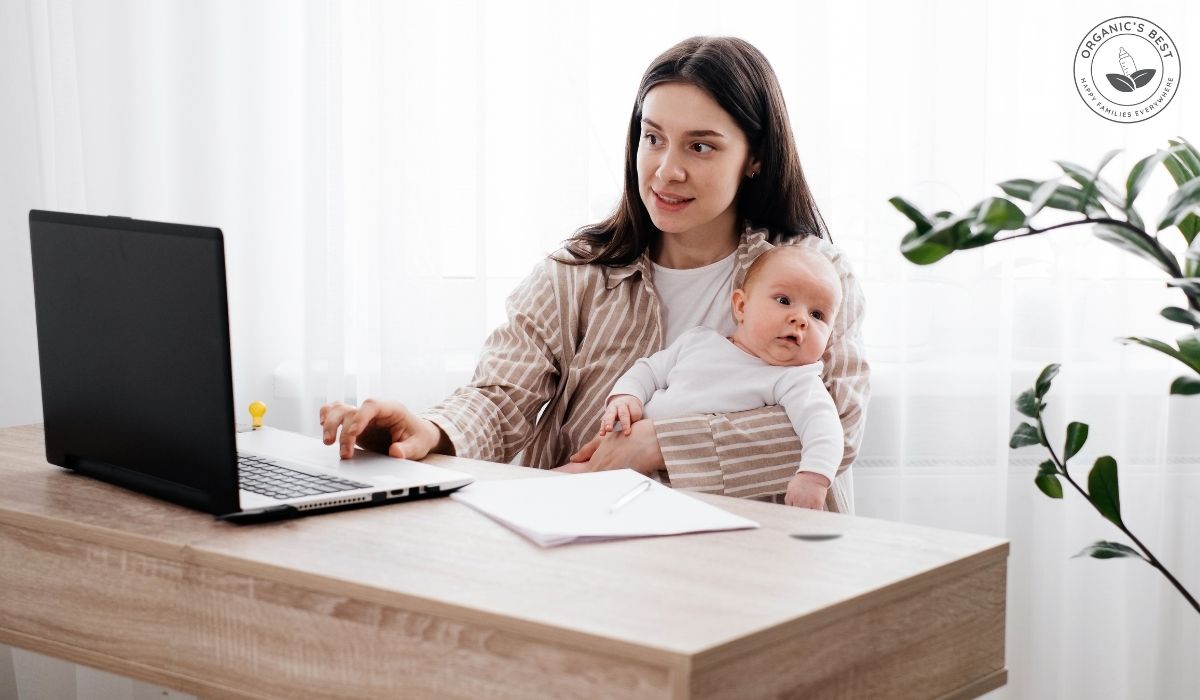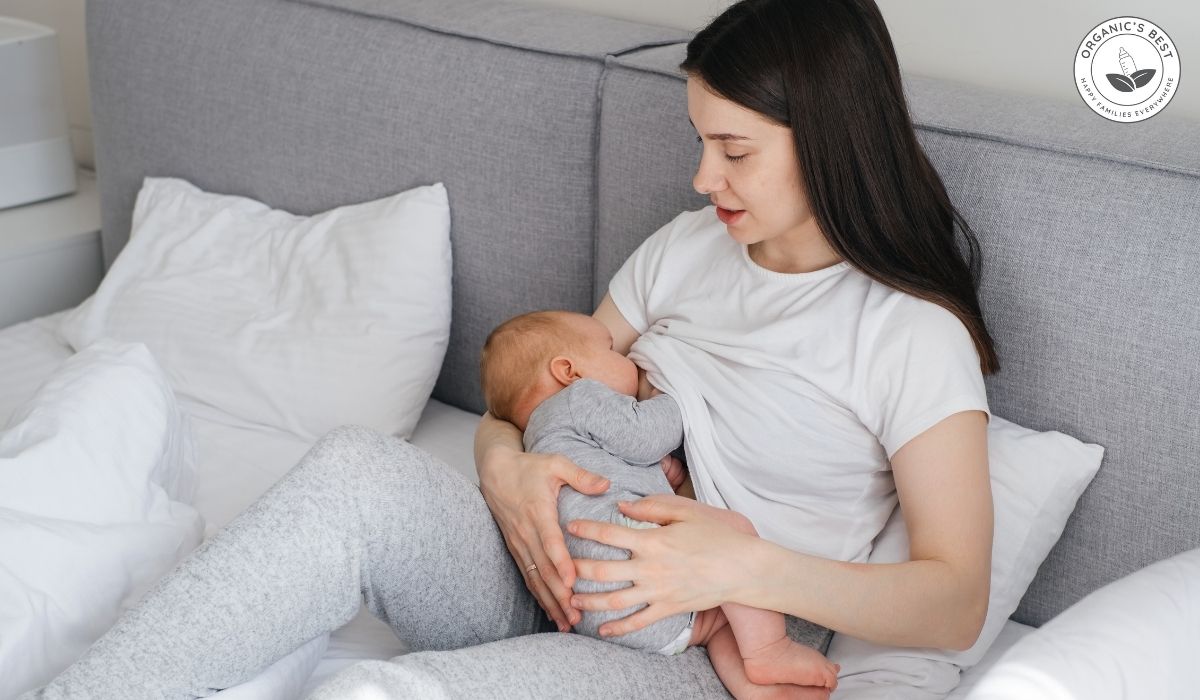Click to Get 2 FREE Boxes/Cans
Click to Get 2 FREE Boxes/Cans
Only New Customers! Click HERE to Get 2 Extra Boxes/Cans for Free With Your First Order.
Only New Customers! Click HERE to Get 2 Extra Boxes/Cans for Free With Your First Order.
BABY FORMULA
Offering new parents top-quality European infant formula from renowned brands like HiPP, Holle, Kendamil, and more. If you’re uncertain about which product to choose, our Formula Finder can help you make the best decision for your baby.
Baby Food
Offering new parents a premium selection of European baby foods, including jars, pouches, cereals, and snacks from esteemed brands like HiPP and Holle.
5 Best Baby Food Recipes (6-8 Months)
by Agustina Fernandez December 21, 2022 7 min read

For the first 6 months of your baby's life, they will mostly rely on breast milk or formula to provide them with all of the nutrients they need, but by 6 months, their diet can begin to look a lot more versatile and abundant.
This time of exploration for your little one can introduce them to new tastes and textures that are sure to excite their palate while also providing them with a nutritional boost. Let's take a look at what the 6-8 month mark can look like food-wise by providing you with yummy homemade baby food recipes for your little one to try.
Table of Contents
What Food is Best for Children 6-8 Months?
It is important to feed your child foods that are appropriate for their age range to avoid risks that may be associated with introducing a food too early. It is also important to keep an eye out for your child's behavior and habits to make sure that it's the right time to introduce your baby to solid foods.
Learn more: When to Begin Introducing Solids to Baby
In this article, we offer you some great homemade baby food to start with and some foods to avoid during this stage.
Foods You Should Always Avoid For Your Baby:
Certain foods have risks associated with them and may be dangerous to your baby’s health if consumed too early. According to the CDC, before 12 months, it is important to avoid the following foods and drinks in your little one's diet.
Learn more: How to Prevent the Development of Food Allergies in Babies

-
Caffeinated beverages
-
Sugar-sweetened drinks
-
Foods that are high in salt
-
Products with added sugar
-
Cow's milk
-
Choking hazards (popcorn, hot dogs, whole nuts, etc...)
What Baby Food to Start with:
There are so many yummy fresh and nutrient-dense foods to add to your baby's diet to get started. Providing your baby with a healthy, well-rounded diet from the start can have long-lasting positive effects on their health.
Fruit and veggie purees are a great place to start and are a super simple option for homemade baby food! Here are some of the best foods for the 6-8 months range:

-
Fruits (bananas, peaches, avocado, blueberries)
-
Vegetables (squash, sweet potato, carrots)
-
Legumes (black beans, lentils, chickpeas)
-
Meat or Poultry
When preparing these foods, especially at the 6-month mark, you want to make sure that they are easy to eat by pureeing or mashing the ingredients. Once your little one reaches the 8-month mark, assuming they are comfortable and adjusting well to solid food, you can begin to introduce foods that are slightly coarser than simply pureed or mashed foods, such as scrambled eggs. This should all be given in addition to breast milk or infant formula.
5 Recipes From The Organic Best Team For Your Baby
Now that we have discussed some of the best foods to introduce to your little one let's look at how to combine these ingredients to make well-rounded homemade baby food recipes.
Making baby food doesn't have to be a hassle. These recipes use a short list of healthy ingredients and are full of flavour. These baby foods can be prepared to serve immediately, or frozen purees can be meal-prepped and kept in the freezer for quick and healthy snacks on those busier days!
Pumpkin Chicken Baby Food Puree

The stars of this homemade puree are pumpkin and chicken. Pumpkin is a great carbohydrate and fiber source that is full of vitamins and minerals such as vitamins A, K, E, C, and Iron. Chicken is a healthy protein that can be made even healthier by choosing organic and free-range chicken to avoid added hormones.
To make this baby food recipe, you will need the following:
-
1/2 small pie pumpkin (de-seeded and cut into wedges)
-
1/4 lb. boneless skinless chicken breast
-
1 parsnip (peeled and roughly chopped)
-
1/2 tsp fresh ginger, minced
-
1-2 cups liquids (water, breastmilk, formula, no-sodium stock)
Preparation:
To begin this baby puree recipe, preheat your oven to 350 degrees F, and prepare and line a baking sheet to your liking. Use a large piece of tin foil to wrap the chicken breast and parsnips, leaving the seams open at the top. Place the foil containing the chicken and parsnips on one side of the baking sheet and the pumpkin wedges on the other side.
Bake for 40-45 minutes; remove the chicken and parsnips at the 30-minute mark and let everything cool. Once cooled, remove the skin from the pumpkin and cube the chicken. Place all ingredients into a blender or food processor for 1-2 minutes until the desired texture is reached.
Notes:
Age: 6+ months
Yield: 30 ounces
Storage: This baby food recipe can be stored in the fridge (3-4 days in an airtight container) or freezer (up to 4 months).
Purple Carrot and Blueberry Puree with Nutmeg

This colourful purple carrot puree recipe contains simple, nutrient-dense ingredients. Carrots, regardless of their colour, contain fiber, vitamins A, C, and B, and potassium, although purple carrots specifically are known for being rich in antioxidants.
To make this baby food recipe, you will need the following:
-
4 large purple carrots (peeled and roughly chopped)
-
1/2 cup blueberries
-
1/4 tsp nutmeg
Preparation:
To begin this recipe, add 2 inches of water to a medium saucepan and bring to a boil. Allow carrots to steam for 10 minutes, and then add blueberries and let steam for an additional 5 minutes. Save some of the steamer water to help reach the desired consistency when blended. Allow everything to cool slightly, and add all ingredients to a blender or food processor.
Notes:
Age: 6+ months
Yield: 12 ounces
Storage: This baby food recipe can be stored in the fridge (3-4 days in an airtight container) or freezer (up to 4 months).
Roasted Root Vegetable Puree with Thyme

Veggie purees are full of fiber and healthy carbohydrates. Root veggies are a great ingredient to use as they are high in antioxidants, and each kind offers its own nutritional benefits to the recipe.
To make this baby food recipe, you will need the following:
-
4 carrots (peeled and chopped)
-
1 medium sweet potato (peeled and chopped)
-
2 parsnips (peeled and chopped)
-
1 golden beet (peeled and chopped)
-
2 tsp oil (olive oil, coconut oil, or avocado oil)
-
1 tsp dried thyme
-
1 cup liquid (water, breastmilk, formula, or no-sodium vegetable stock)
Preparation:
To begin this recipe, preheat your oven to 400 degrees F and prepare a baking sheet to your liking, either lined or sprayed. Place root vegetables on the sheet and drizzle with oil. Once they are well coated add dried thyme and use your hands to mix everything together.
Bake for 30 minutes, stirring at the 15-minute mark. Let cool slightly, then add all ingredients to a blender or food processor for 1-2 minutes. Additional liquid can be added to achieve the desired consistency.
Notes:
Age: 6+ months
Yield: 30 ounces
Storage: This baby food recipe can be stored in the fridge (3-4 days in an airtight container) or freezer (up to 4 months).
Blueberry Chickpea Puree with Rosemary

This super simple recipe requires only 3 ingredients and little preparation. Blueberries are often considered a superfood for being low in calories but high in nutrients! They contain powerful antioxidants as well as fibre, vitamin C, K, and manganese.
To make this baby food recipe, you will need the following:
-
1/2 cup blueberries
-
1/2 cup chickpeas (strained and rinsed)
-
pinch fresh rosemary (coarsely chopped)
Preparation:
For this recipe, you just need to add all the ingredients to a blender or food processor. A smooth puree should take 1-2 minutes. For a chunkier consistency, pulse 10 seconds at a time, adding a small amount of liquid each time until the desired consistency is reached. You may have to scrape the sides occasionally to help the blending process.
Notes:
Age: 6+ months
Yield: 8 ounces
Storage: This baby food recipe can be stored in the fridge (3-4 days in an airtight container) or freezer (up to 4 months).
Spiced Pear and Oat Baby Food Puree

To make this baby food recipe, you will need the following:
-
2 pears, peel, core, and roughly chop
-
1/4 cup oats (Holle oats)
-
3 dates
-
1/4 tsp cloves
-
1 cup water
Preparation:
To start this baby food puree recipe combine everything except the dates into a medium saucepan and heat for 10-15 on medium-low, stirring occasionally. You will know it's done when the pear is tender.
While that is heating, soak the dates in a bowl filled with warm water for about 10 minutes. Add all ingredients to a blender or food processor. Smooth baby food purees should take 1-2 minutes. For a chunkier consistency, pulse in 5-second intervals.
Notes:
Age: 6+ months – stage 2 or 3 baby food
Yield: 15 ounces
Storage: This baby food recipe can be stored in the fridge (3-4 days in an airtight container) or freezer (up to 4 months).
Get More Easy Recipes: TOP 7 Baby Food Recipes: Puree (Stage 1) 👩🍳
Conclusion
We hope that you got some yummy pureed foods recipe inspo! Remember that whether you choose to feed your little one homemade baby food or store-bought baby food, what's important is that they are getting all of the nutrients that they need through whatever means works best for their growing body.
|
Disclaimer: Please be aware that this information is based on general trends in babies, and it is not medical advice. Your doctor should be your first source of information and advice when considering any changes to your child’s formula and when choosing your child’s formula. Always consult your pediatrician before making any decisions about your child’s diet or if you notice any changes in your child. Breastfeeding is the best nutrition for your baby because breast milk provides your child with all the essential nutrients they need for growth and development. Please consult your pediatrician if your child requires supplemental feeding. |
Agustina Fernandez
Dr. Agustina Fernandez earned her medical degree from the prestigious Universidad Nacional de Córdoba, Argentina. With a deep-rooted passion for pediatrics, Dr. Fernandez is currently on the path to specializing in children's healthcare. Recently, she has delved into the vital field of infant nutrition. Her research interests include breastfeeding, infant formula, and baby food in little ones’ formative years. Dr. Fernandez's commitment to this area of study underscores her dedication to ensuring the health and well-being of children from their earliest days.
Leave a comment
Comments will be approved before showing up.
Also in Organic Infant Nutrition and Health Blog

10 Winter Activities for Kids and Toddlers
by Agustina Fernandez January 06, 2026 8 min read
Read More
How to Choose The Best Infant Formula: A Guide to EU Organic Formulas
by Agustina Fernandez January 05, 2026 14 min read
Read More
Best Formula for Breastfed Babies 2026 Guide
by Agustina Fernandez January 05, 2026 15 min read
Read More
Reviewed by Dr. Bardha Citaku, MD
-

Dr. Bardha Citaku: Medical Reviewer of Organic's Best Blog
Dr. Bardha Citaku completed her medical studies at the University of Prishtina in Kosovo, where she began her journey into the field of medicine. She has since developed a career in medical research, contributing to projects with notable organizations, including the World Health Organization (WHO).
